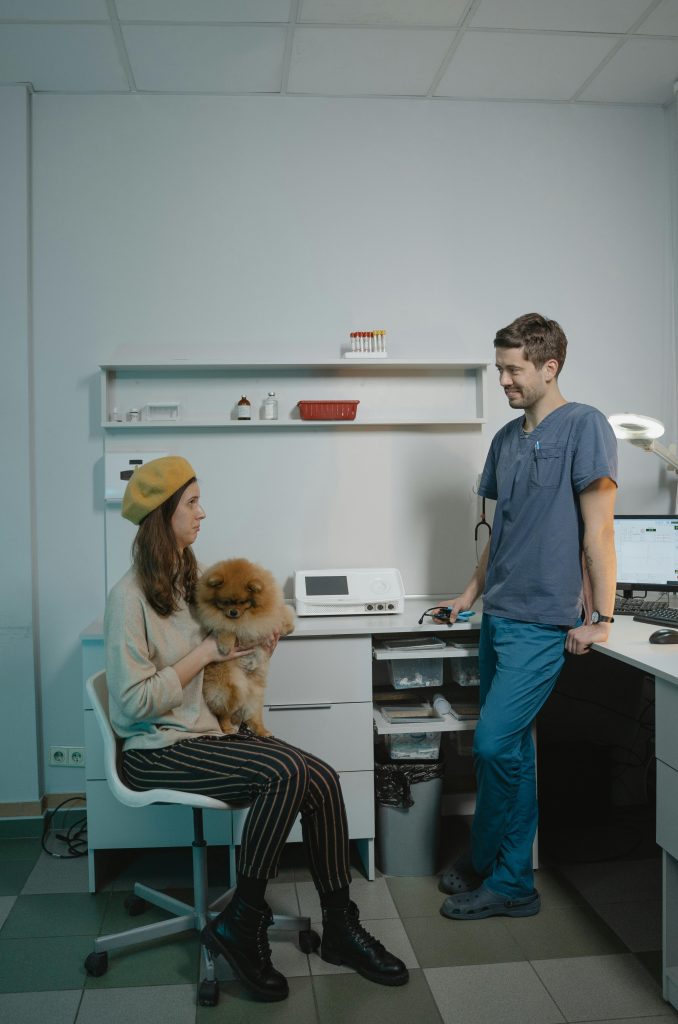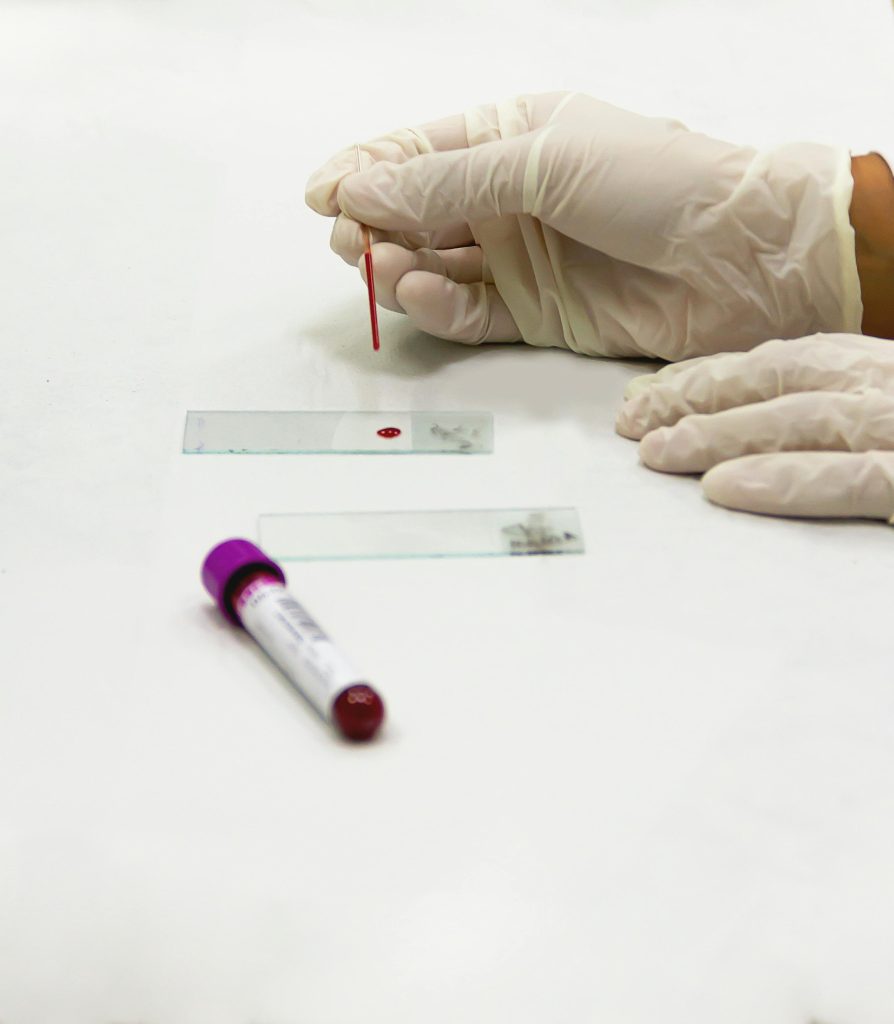
UNDERSTANDING THE IMPORTANCE AND COMPONENTS OF A VETERINARY WELLNESS CHECKUP
When you take your pet for a bi-annual or yearly vet visit, you might not fully understand what a comprehensive veterinary wellness checkup entails. Preparing questions and bringing a list of changes in behaviour, new concerns, symptoms, and supplements will help you and your veterinarian better care for your pet’s health. During the visit, your vet should ask detailed questions about your pet’s diet, overall condition, and environment, perform a thorough physical examination, and may likely conduct diagnostic tests to assess internal health comprehensively.
Is your veterinarian proactive, focusing on preventive care, or do they only address issues as they arise? This distinction is crucial for your pet’s health and longevity. A proactive vet regularly monitors your pet’s well-being to catch potential problems early, while a traditional vet might only address issues once they become apparent. Understanding your vet’s approach is essential for ensuring your pet receives the best possible care. If your current veterinarian does not prioritize preventive care and thorough examinations, it might be time to consider finding one who does.
Dr. Karen Becker is a proactive wellness vet that I follow and I agree with her that the following are important pet parent must-knows for your pet’s yearly (or bi-annual) wellness visits. It is important to understand what your vet will look at which can help you make the most of this important visit. Check out the book she co-authored with Rodney Habib called The Forever Dog and The Forever Dog Life is the most recent one I am looking forward to reading!
Also read our previous post on vet-visit tips here.

THE INFORMATION-GATHERING PART
For furry patients, since they can’t communicate directly, vets rely on you to describe any changes in their behaviour so they can understand their symptoms. It’s crucial for them to know when they last ate, drank, pooped, and/or vomited. They will not think you are silly when they receive photographs of your pet’s stools, vomit, and urine if they are unwell, as this aids in accurate diagnosis.
Always provide a precise timeline of events, as their diagnosis depends on both their examination findings and the information you provide. Following your vet’s recommendations for medication and diet is essential for your pet’s recovery, including administering medications at the correct times and completing the full course as prescribed. Always be honest with your vet if you want the best care for your pet.
Craig View Veterinary Clinic also emphasize how effective communication between you and your vet is crucial for your pet’s health. Honesty is the best policy. Don’t worry about being judged if you waited too long to bring your dog in for itchy ears or missed some doses of medication. What matters is providing your vet with accurate information:
- How many doses of medication were missed?
- How long has the problem really been going on?
- When did you first notice the tumour?
- What are you truly feeding your pet and how much?
- Veterinarians need the truth to formulate a correct diagnosis and treatment plan since our patients can’t speak. We’ve seen it all, and our goal is to help your pet, not to judge.
Some pet parents may not fully grasp the details of their vet’s examination process, as communication styles differ among veterinarians. While some vets explain their findings as they examine your pet, others might be less forthcoming. If your vet isn’t providing enough information, don’t hesitate to ask questions and seek clarification if any explanations are unclear. Your pet’s health depends on it.
Always ask questions. If you don’t understand something, let your vet know so they can explain it better. If you think you can’t follow through on instructions, make your expectations clear. Tell your vet what you need. If you have time constraints or financial restrictions, your vet may work with you to find a solution.
Many proactive veterinarians recommend bi-annual checkups for pets over the age of seven, as significant health changes can occur within six months. Waiting a full year between visits might delay the detection of medical issues that could have been addressed earlier with more frequent checkups. This proactive approach highlights the importance of regular veterinary visits, not just waiting for symptoms to appear before seeking medical attention.
QUESTIONS YOUR VET MAY (SHOULD) ASK
Whether you opt for comprehensive examinations every 6 months or annually, your vet should either have you fill out a “catching up” form or ask you the following questions during your wellness visit according to Dr. Karen Becker:
- What has your pet been eating the last 6 months (what brand and protein; if you’re feeding a homemade diet, what recipe are you following)?
- How much food is your pet eating a day, and what’s the brand and number of treats?
- Have you noticed a change in your pet’s appetite or food intake or a weight gain or loss?
- What type/brand of chew toys, recreational toys or bones do you provide and how often?
- What’s your pet’s daily exercise routine?
- Have you noticed a change in your pet’s activity or energy level?
- Any limping or stiffness noticed?
- Have you noticed any changes in your pet’s urination or defecation habits? Any potty accidents in the house? Any change in stool consistency or vomiting?
- Have you noticed a change in your pet’s breathing or is she coughing?
- Is your pet drinking any more than usual?
- How often are you brushing your pet’s teeth? Have you noticed mouth odor?
- Do you think your pet’s vision has changed in the last 6 months?
- How well do you think your pet can hear?
- Have you removed any ticks or other parasites from your pet since your last visit?
- Is your pet shedding, licking or scratching more than normal?
- What household and yard chemicals are your pet exposed to on a regular basis?
- Is your pet sleeping through the night? Any restlessness, vocalizing or personality changes?
- Any behaviour changes, or changes in interaction with you/your family?
- Any major household changes since your last visit (new house, new job/schedule, new baby, etc.)?
- Has your pet been to the ER for an unexpected problem since your last visit?
- Any unexpected slips, trips or falls? Knuckling or stumbling?
- What medications and supplements are you giving your pet?
- Have you noticed anything new or different that is concerning to you in the last 6 months?
Dr. Karen adds that these questions generate important conversation about what you’ve noticed since your last wellness exam and help guide your veterinarian’s physical exam, suggestions, and advice. If your vet doesn’t ask you any of these questions during your wellness exam, he or she is very likely not a wellness-oriented practitioner, and she suggests to consider also adding a proactive vet to your pet’s healthcare team.
QUESTIONS YOU CAN ASK
Prepare some questions before you visit the vet as we often forget something we should have mentioned or wanted to ask during the process. Bringing a list of observations or concerns about your pet’s health or behavior since the last visit can also help facilitate a more productive discussion. Here are some examples:
- Is my pet at a healthy weight?
- Is my pet up to date on vaccinations?
- Is this (add odd behaviour) normal?
- How is my pet’s dental health?
- Could I be providing more appropriate food?
- What tick/flee medication would you recommend?
- What are these lumps or bumps?
- Would my pet benefit from more grooming?
- At what age is my pet considered a senior?
- Any preventative care I can provide my pet?

FULL BODY INSPECTION – FBI
The physical exam is a crucial part of your pet’s wellness checkup, as all body systems need to be assessed for any abnormalities. During the exam, your wellness vet will check your pet’s weight, muscle tone and mass, joint range of motion, and compare these findings to previous exams and the norms for the breed, age, and gender.
It is important that your pet is used to getting touched and examined. You can do this in a rewarding way at home, so they are not too stressed when the vet checks their eyes, ears and other body parts. The following parts should be checked:
- Mouth
- Neck
- Ears
- Eyes
- Heart
- Lungs
- Abdomen
- Base of tail
- Leg and core
- Coat, skin, nails
In addition, Dr. Karen Becker shares how integrative and holistic veterinarians will also palpate the vertebrae down the spinal column, assess joint range of motion and health, assess the body according to TCM (traditional Chinese medicine), ayurvedic or homeopathic principles, and assess pain or guarding behaviours as well as areas of tension, heat or cold. A neurologic assessment will also be performed.
DIAGNOSTIC TESTS
It is crucial to remember that although your pet looks “fine”, there is only so much your vet can see with a physical exam. Often disease can be “hidden”. I believe it is crucial to spend money on the blood work and other diagnostics too, especially with older pets. The sooner you can pick up a disease the better you can treat it.
Here are common tests wellness veterinarians run to assess your pet’s internal wellbeing as shared by Dr. Karen (U.S):
Complete blood count (CBC) and serum chemistry panel — The CBC gives information on hydration status, anemia, infection, the blood’s clotting ability, and the ability of your pet’s immune system to respond.
Urinalysis — The test is used to assess the overall health of your pet’s urinary tract, including the kidneys and bladder, and to check for other health indicators such as glucose regulation and liver function.
Blood pressure measurement — This test checks your pet for hypertension (high blood pressure) as pets can also suffer from it.
Thyroid screen — The thyroid screen helps diagnose thyroid disease, which is an especially common ailment in older cats and dogs.
Glaucoma screen — Glaucoma testing measures the pressure in each of your pet’s eyes quickly and painlessly. This is an important test because undetected glaucoma can lead to permanent blindness.
Retinal exam — This eye test is used to check for evidence of problems deep in the eyes by viewing the structures beyond the lens, through the pupil.
X-rays or Ultrasound — Digital radiographs (x-rays) and/or ultrasound, if indicated, can also be helpful as part of a pet wellness checkup. If your vet finds abnormalities on physical examination, additional diagnostics, including digital x-rays and ultrasound, may be needed to identify the underlying problem.
SNAP 4Dx Plus or Accuplex4 (dogs) — These tests screen for exposure to tick-borne illnesses, including Lyme disease, ehrlichiosis, and anaplasmosis, and also check for heartworm disease.
FeLV/FIV testing (cats) — When it makes sense (for example, if you’ve just rescued a kitty or your cat has never been tested), these tests are run to check for the presence of the feline leukemia and feline immunodeficiency viruses
Fecal Examination — An internal parasite analysis, via microscopic fecal examination, is important for ruling out common parasites your pet can acquire from walking through his environment (without protective footwear).

If something makes you unhappy, please inform the vet or staff immediately so they can address the issue. Sharing partial stories on social media can be disheartening for veterinarians who, due to professional conduct, cannot reply.
While your vet is the professional, you know your pet best and are their primary advocate. As an attentive guardian, you’re in the best position to make informed decisions for your pet, which may not always align with your vet’s recommendations. Discuss your concerns with your vet because finding a vet who shares your proactive wellness philosophy is essential. Prevention is the best medicine, and having a vet who agrees with this approach is crucial.
Most veterinarians and their teams genuinely want your pet to be healthy and for you to be happy. I believe in common sense, proactive veterinary medicine to achieve optimal wellbeing and health span.
Next week we will look at some winter tips to keep your pets safe and warm.
WHEN YOU KNOW BETTER, DO BETTER!